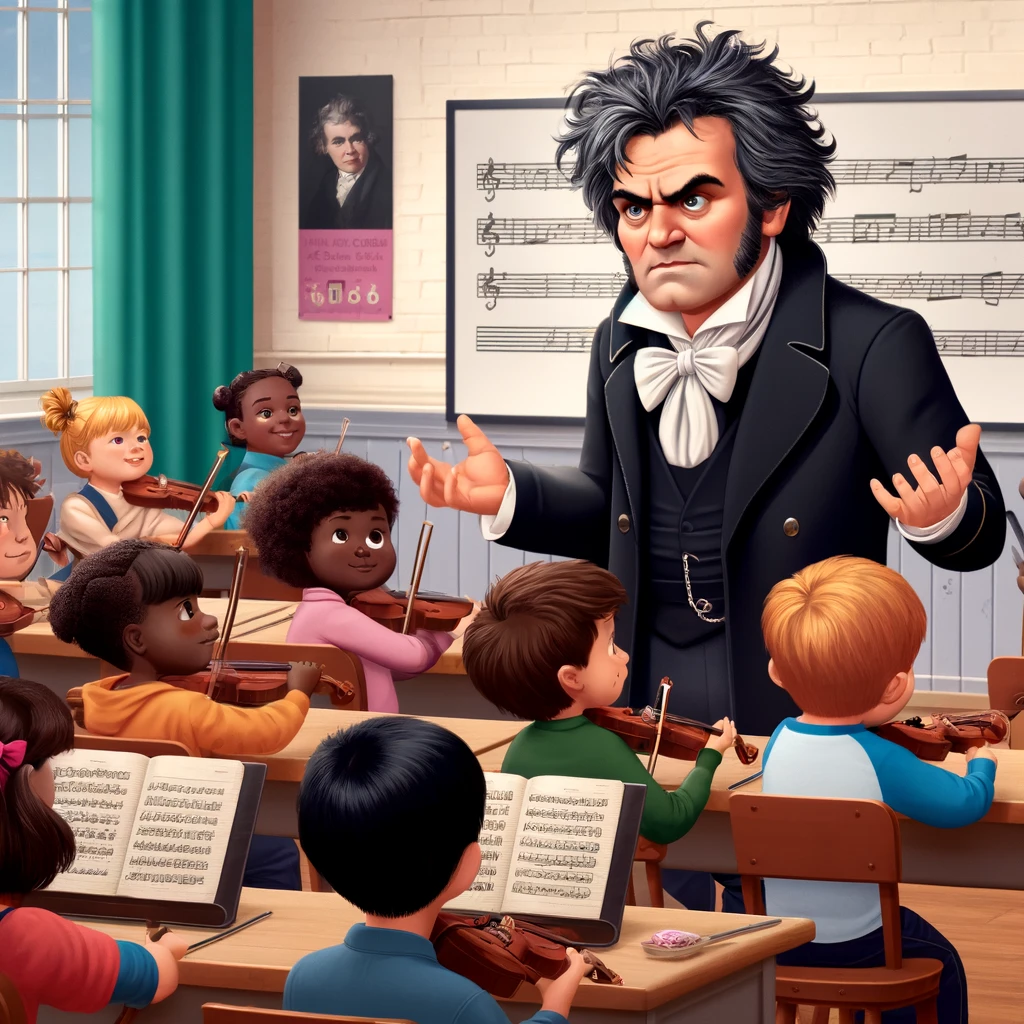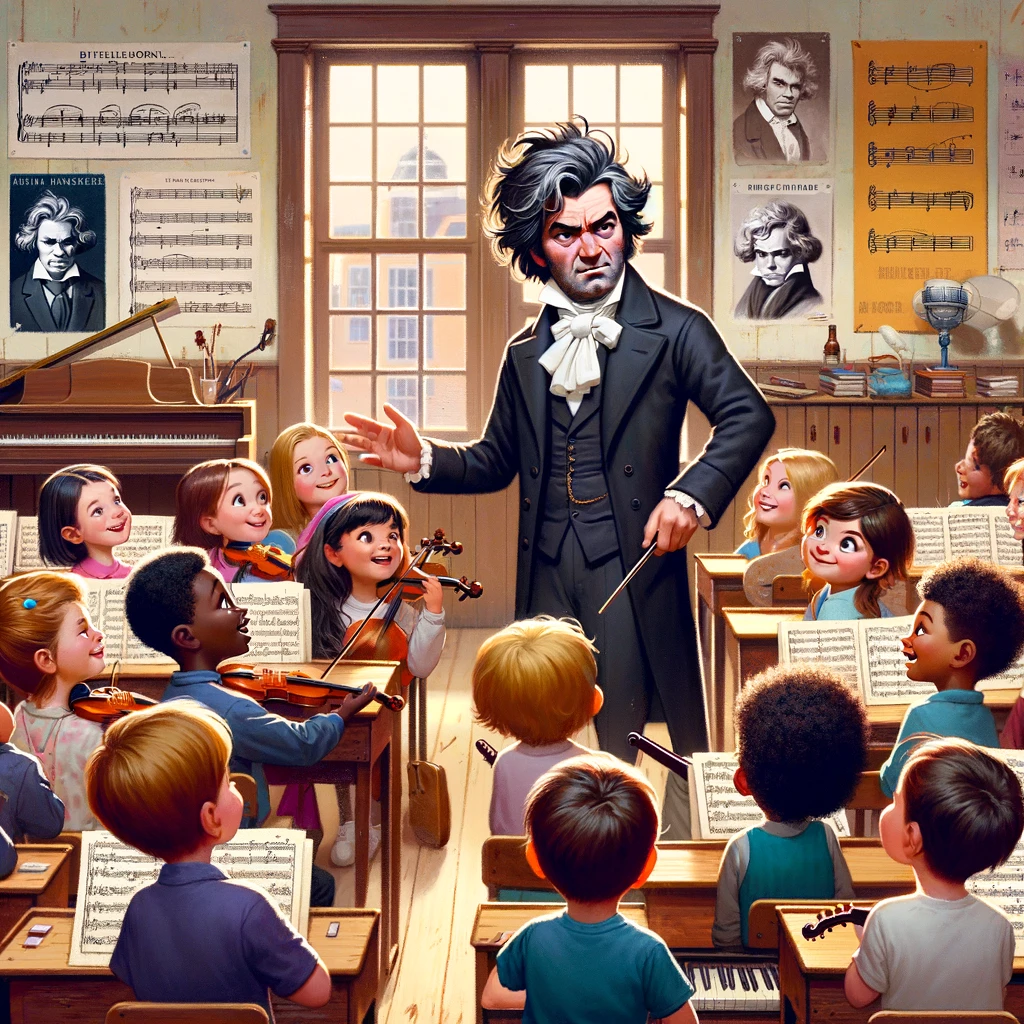
Beethoven’s Impact on Music Education
Ludwig van Beethoven is not just a name that resonates through the corridors of music history; he has become an integral part of education systems around the world. His compositions, which broke boundaries and introduced new musical philosophies during and beyond his time, continue to influence how music is taught in schools today. This article explores the global impact of Beethoven’s music on educational curriculums and how his legacy is cultivated in the minds of young students.
Beethoven’s Music in the Classroom
Beethoven’s work is often introduced to students as part of a broader curriculum that aims to cover Classical and Romantic music. His pieces, such as “Symphony No. 5,” “Fur Elise,” and “Moonlight Sonata,” are not only staples for listening but also serve as key material for studying music theory and composition. Teachers use these works to demonstrate various elements of music such as rhythm, melody, harmony, and dynamics. Moreover, Beethoven’s ability to convey emotion and narrative through music makes his works fitting for lessons in music appreciation and history.
Why Beethoven?
The inclusion of Beethoven in music education is not merely due to his status as a monumental figure in Western art music. His life story and approach to music offer rich lessons in resilience, creativity, and the pursuit of innovation despite personal and professional challenges. Deafness, perhaps his most significant hurdle, did not hinder his compositions, which grew only more profound and expressive as his condition worsened. This aspect of his life provides a powerful narrative for students, emphasizing perseverance and the importance of continuing to strive for personal expression.
Methodologies of Teaching Beethoven
Educators employ various methodologies to teach Beethoven’s music. Some focus on the technical aspects, using his compositions to illustrate key concepts in music theory. Others take a more holistic approach, integrating his music into broader discussions about art, culture, and history to highlight the socio-economic conditions of 19th-century Europe. This interdisciplinary method helps students understand the context in which Beethoven wrote his music and its subsequent impact on Western culture.
Interactive teaching methods, including group performances, listening sessions, and digital presentations, also play a crucial role in engaging students with Beethoven’s music. Such activities not only make learning about Beethoven more interactive but also more memorable. Schools often encourage students to perform pieces by Beethoven, which helps them develop a deeper connection with the music through hands-on experience.
Beethoven’s Music and Emotional Education
Educators are increasingly recognizing the importance of emotional education in schools, and Beethoven’s music, known for its depth of emotion, serves as a perfect educational tool in this regard. By engaging with his music, students explore complex emotions and learn to express themselves in ways that words cannot. This emotional exploration is essential in developing empathy and emotional intelligence.
Beethoven Around the World
The teaching of Beethoven’s music is not confined to Western countries. Schools across Asia, Africa, and South America have also incorporated his works into their music curriculums. In many of these places, Beethoven is seen as a symbol of the universal language of music that crosses cultural and national boundaries. This global approach not only enriches the students’ musical experience but also fosters a more inclusive understanding of cultural diversity.
Challenges in Teaching Beethoven
Despite the enthusiasm for including Beethoven in school music curriculums, there are challenges. One major issue is the accessibility of resources. While well-funded schools can provide students with instruments and quality music education, underfunded schools struggle to afford these basics, which can limit students’ full engagement with Beethoven’s repertoire.
Additionally, the classical focus on Beethoven’s works can sometimes overshadow other important music traditions and genres, which might offer equally valuable lessons and musical experiences. Educators are tasked with balancing the curriculum to include a wide range of musical experiences while still honoring Beethoven’s significant contributions to music.
The teaching of Beethoven’s music in schools around the world is a testament to his enduring legacy and the universal appeal of his compositions. Through his music, students not only learn about music itself but also about history, culture, and the power of human expression. As education systems evolve, the challenge will be to continue to find innovative ways to teach his music, ensuring that Beethoven’s impact on music education remains as dynamic and profound as his compositions.

Beethoven’s music, with its rich emotional layers and complex structures, provides an excellent platform for teaching a variety of educational skills. Beyond music theory and performance, his works can be utilized to develop critical thinking and analytical skills. Students learn to dissect and interpret the compositional techniques and thematic material, applying these insights to understand broader artistic concepts.
Integration of Technology in Teaching Beethoven
In the digital age, technology plays a pivotal role in enhancing the educational experience surrounding Beethoven’s music. Interactive software and apps allow students to explore Beethoven’s scores in detail, manipulating elements to see how changes affect the overall composition. Online platforms offer virtual performances and masterclasses, making Beethoven’s music more accessible than ever. Additionally, digital tools can help bridge the gap in resources between well-funded and underfunded schools by providing virtual access to music and performances that would otherwise be unavailable.
Beethoven’s Music as a Tool for Inclusivity
Music education, particularly through the works of Beethoven, provides a unique opportunity for inclusivity in the classroom. Students from diverse backgrounds can find common ground in the universal themes expressed in his music, such as struggle, triumph, and the human condition. Teachers have the opportunity to use Beethoven’s music as a springboard to discuss broader issues of cultural significance, promoting an environment of tolerance and understanding.
The Future of Beethoven in Education
Looking to the future, the role of Beethoven in education seems assured, but it will continue to evolve. As curriculums become more global and inclusive, the challenge will be to adapt the teaching of Beethoven’s music to remain relevant and engaging for young learners. This might include more cross-disciplinary approaches that link music education to technology, social studies, and even science.
For instance, exploring the physics of sound through Beethoven’s symphonies or examining the psychological impact of music on the human brain are ways that his work can be linked to scientific topics. Such approaches not only broaden the appeal of Beethoven’s music but also enhance educational outcomes by showing students the interconnectedness of different fields of knowledge.
Community Engagement Through Beethoven
Schools can also extend the influence of Beethoven’s music beyond the classroom by involving the community. Concerts, open school events, and partnerships with local orchestras can engage parents and community members, making Beethoven’s music a bridge between generations. This not only enhances students’ learning experiences but also builds community bonds through shared cultural experiences.
Conclusion
Beethoven’s music remains a powerful educational tool that goes beyond the mere study of notes and rhythms. It encompasses lessons in history, culture, emotional intelligence, and even science, making it a comprehensive medium for education. By continuing to innovate in how we teach and engage with his music, educators can ensure that Beethoven’s legacy continues to inspire and educate students around the world. His music, transcendent of time and place, promises to continue shaping young minds and encouraging them to appreciate the profound beauty and complexity of musical expression.